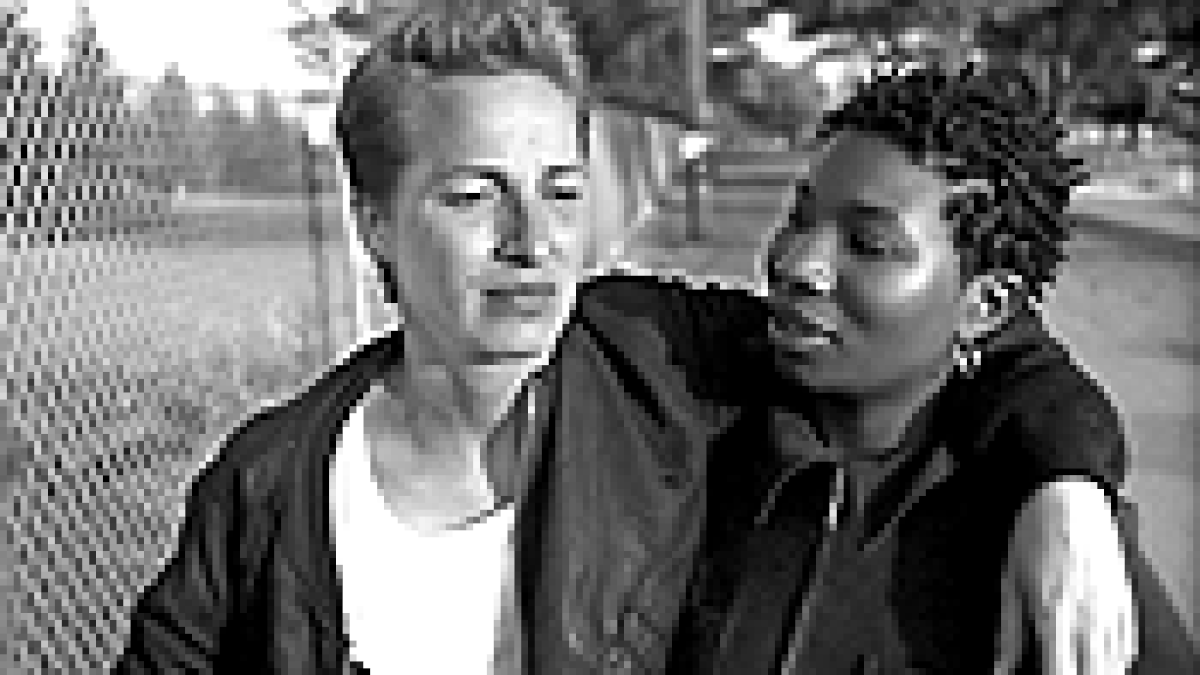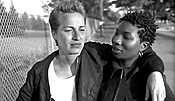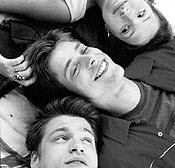Someone must have whispered the youth-market mantra to the good folks at Frameline, because this year’s SF International Lesbian and Gay Film Festival has a distinctively youthful tilt. Oh, there are plenty of serious documentaries, mock-Hollywood camp fests, a particularly fine turnout from France, and a closing night extravaganza built around filmmaker Alex (Hedwig and the Angry Inch) Steyermark’s rocker-girl feature Prey for Rock ‘n’ Roll, but just below the surface, in fact running through the entire festival, is a young current that cannot be denied.
“Homo Hop,” one of the fest’s numerous shorts programs, is a must-see for queer youth grown impatient with corny torch songs mouthed by aging drag queens — four urgent video shorts with a hip-hop beat. The best of these is probably Maria Clara’s Life on Christopher St. , a zesty digital video-on-the-sidewalk portrait of New York’s Lower West Side LGBT street scene: the gay mecca of Christopher Street, hustling on West Side Highway, self-identified “homothugs,” and the determination of young gay rappers to combat hip-hop homophobia, by fighting it out if necessary. The filmmaker doesn’t spell it all out as a race and class struggle, but it is. Meanwhile in Oakland, HomoHop introduces us to a new wave of gay hip-hop artists like Dutch Boy of Rainbow Flava, Juba Kalamka of the Deep Dickollective, and female rappers Hanifah Walidah, God-Des, and Jen-Ro — all shown in performance at the Black Box during the World HomoHop Festival. The rappers share their philosophy as well. Says Dutch Boy: “The preeminent culture for outsiders is hip-hop”; however, “hip-hop doesn’t necessarily accept anyone.” This exhilarating doc, directed by Alex Hinton for Queer Youth TV (makers of Queercore), makes a point of letting its beat boys and girls challenge other hip-hop artists on their homophobia. They refuse to relinquish their music. It means too much to them.
At the front of the strong French contingent at this year’s fest is Fabrice Cazeneuve’s You’ll Get Over It (Tu verras, ça te passera), the deceptively straightforward story of Vincent, a high-school champion swimmer from a mostly-white exurb who stumbles out of the closet and forgets to slam the door. One of the things we learn from this film is that in France, high-school students drink beer with lunch (what would William Bennett say?). More importantly, filmmaker Cazeneuve and actor Julien Baumgartner do a brilliant job of etching a character who refuses to conform to stereotypes — even gay ones. Vincent has a girlfriend at the beginning of the movie, and he continues to rely on her after he’s outed by graffiti at school. He hates the Marais, Paris’ gay district (“I felt like a piece of merchandise”). Vincent’s family is just as un-pigeonhole-able: his father is a communist union organizer and his brother, an unhappy amateur boxer, doesn’t shed his family black sheep image even after Vincent comes out. No hysteria, very little violence. Must be something in the bread over there. As Frameline publicist Joan Gibson puts it: “The French movies are so good; I wish Americans could make stories like these.”
Just as sly, in a more commercial whodunit framework, is another French-language entry, Francis Girod’s Belgian-produced Gender Bias (Mauvais genres), sort of a Nancy Drew murder mystery — if Nancy Drew were a pre-op male-to-female tranny named Bo. Someone is killing the transgendered hookers of Brussels. The cops, led by veteran actor Richard Bohringer, are either too corrupt or too preoccupied to be of service, so Bo (convincingly played by Robinson Stevenin) solves the case while tailing her heartthrob, a bisexual hood named Johnny. It’s a detective story with a twist: instead of beating people up, Bo gets beat up herself. A lot. Everyone in this movie is rotten except for Bo. He’s merely confused, and bruised. The denouement would require a large chart to properly explain.
On the riot grrl side of the spectrum, Diego Lerman’s 2002 Argentine drama Suddenly (Tan de repente) takes us on a journey of discovery with three women — Marcia, a dull shopgirl; and Mao and Lenin, the two butchy women who pick up Marcia on a Buenos Aires street (“Do you want to fuck?”) and take her on a road trip in search of, yes, themselves, in the seaside town of Rosario, with sex and rebellion whipped together in a sour, no-frills blender, in tones reminiscent of early Godard. But then halfway through, it dawns on us that first-time filmmaker Lerman is making the lesbian version of Y tu mamá también — the sort of movie that sends feminist film theorists running to their thesauruses.
The festival’s opening night bonbon (Thursday, June 12, 7:30 at the Castro) is Die Mommie Die, a suitably uproarious camp roasting of silly Hollywood soap opera feature films from the ”60s, the kind that always starred an over-the-hill actress like Barbara Stanwyck. Screenwriter/actor Charles Busch, in full drag, fills the hole admirably in the role of one Angela Arden — ex-entertainer, Beverly Hills mom, collector of young men, and bitch — the type of character who always has a pin spotlight on her. Busch has a pretty thick neck for this line of work, but he zings the howler dialogue like a pro, in his best Greta Garbo/Eve Arden voice: “One feels the memory lingering like smog over the canyon.” Naturally, Angela has a gay son (Stark Sands, “They found me being spun around nude on the lazy Susan”), a nympho daughter (Natasha Lyonne), a young stud boyfriend (Jason Priestley), a dimwit housekeeper named Bootsie (Frances Conroy of Six Feet Under), and a movie producer husband she’s tired of (Philip Baker Hall, in Lew Wasserman specs, looking exactly like Peter Bogdanovich). One arsenic suppository, an LSD trip, and several sex scenes later, Angela gets her Norma Desmond exit. Laugh your wig off.
Berkeley filmmakers Sara Millman and Khahtee V. Turner are responsible for the most tantalizing film of the fest, a lesbian crime pic called Robin’s Hood. Tantalizing, because with a little script doctoring and tighter direction, it could have been wonderful. Millman and Turner’s story of the bank-robbing career of disillusioned social worker Robin (ably played by Turner herself) and car-mechanic-turned-criminal Brooklyn (Clody Cates) has a few burn holes in it, but the characters shine through believably even when the scenario doesn’t. Robin’s Hood was shot on video in the streets and neighborhoods of the East Bay, peopled by convincing non-actors. The animated end-credit sequence is very good. Their next movie is going to be much better.
Judy Wilder and Laura Barton’s Dildo Diaries is sure to be a crowd-pleaser. How could it miss — it’s about sex toys and the Texas Penal Code. Introduced by columnist Molly Ivins’ chortling dismissal of Texas state lawmakers as “dipshits” when it comes to sexual matters, Wilder and Barton’s lighthearted documentary has great fun with the official definitions of perversion in Texas, drops into an Austin shop for a look at their “educational models” (y’all aren’t allowed to ask for “dildos”), then stops in Vegas (sex toy convention), the Museum of Questionable Medical Devices in Minnesota, and the San Fernando Valley (the Topco sex toy factory) on its way to hearing from Bay Area sexperts Carol Queen and Annie Sprinkle. But the real star of the show is Texas State Representative Warren Chisum (“a Bible-thumping dwarf” in Ivins’ estimation), who looks embarrassed just to be alive.
Also recommended are Get a Way (aka Cavalcades), French director Noah Nuer’s blithe-spirited story of a gay man accidentally falling in love with a straight woman in Paris (they meet in a traffic dispute); Eytan Fox’s Yossi & Jagger, a very well done portrait of two male Israeli army officers who have to sneak out of their listening post on the Lebanese border to gain a few minutes of togetherness in the snow; and the “Mamas and Papas” shorts package. The best film in that package — and one of the funniest in the fest — is Adele Wilson and Eve Whitaker’s Donor, in which a lesbian couple want a baby, and ask the brother of one of them to donate sperm for the project.
But why stop there? Frameline’s SF fest, which claims to be the world’s number-one showcase for queer cinema, boasts 78 feature films and a whopping 193 shorts from 33 countries, with work by 41 local Bay Area filmmakers. And you don’t have to be lesbian, gay, bisexual, or transgendered to enjoy their selections. “Human” is enough. Check out the full schedule at www.frameline.org/festival













